A little late to the party, I know. But there are only so many dramas a busy person can consume in a given year. This drama surprised me by not being as bad as I had heard. I picked it up recently after seeing Lee Je-hoon in the first couple of episodes of Taxi Driver when I felt like I needed more of him on my screen. Since his co-star Shin Min-a is someone I have no aversion to it all made perfect sense. In fact their on-screen chemistry is a joy to watch as they navigate their way around the pitfalls of living a marriage that comes with a secret. It makes all the difference when good actors are at the helm. Whoever thought of bringing those two together had a stroke of brilliance. Both Lee Je-hoon and Shin Min-a are a very convincing double-act.
I don’t watch a lot of romcoms these days because I like variety and I’m partial to crime. But apart from one or two gems that come our way every year, it’s an overworked genre for me. In many ways this has some of the classic rom com elements: the early antagonism, misunderstandings, the obligatory push and pull. That, however lasts all of 3 episodes because the male protagonist is unusually quick to offer the olive branch and his hand in marriage. More importantly however courtship is not the subject of this drama.
I wish now that I had seen it while it was airing because I have so much to say about every episode. Storytelling is top-notch and it contains such a rich tapestry of ideas while simultaneously being delightful and heartwarming.
Time travel here sets the stage for the storytelling. Like 99% of time slip dramas coming out of K drama land, there’s no reason to get scientifically serious about this one either. Trying to get the science (if there’s any) is a labour that usually ends up in tears. It’s window dressing… but important window dressing nonetheless. Time travel allows Soo-joon to experience the future, gain useful knowledge to take back to the present used at his discretion. The mechanics are simple even if it struggles to be consistent. In short, time manipulation here is nonsensical but it achieves several key goals. It expedites an unlikely courtship and provides a vaguely acceptable rationale for expediting nuptials. It also sets up some kind of nebulous relationship between Fate and human will. Not necessarily in direct opposition but as two agencies that could be at odds with each other or, on the other hand, work in tandem because some outcomes are bound to happen given the individuals involved. It’s dramaland’s version of the old religious debate of divine will vs human activity.
Making trips to the future inevitably has its downsides. Soo-joon is so preoccupied with the benefits that he fails to see the inherent drawbacks. It’s certainly good for business having foreknowledge of where lucrative real estate deals come up in the future. Business is so good that he’s become a wealthy CEO of a well-regarded real estate company Myreits. It’s a gravy train for Soo-joon. On top of that, long time best friend Ki-doong does all the heavy lifting while everyone is led to believe the oft-absent Soo-joon is inexplicably a real estate genius. This allows Soo-joon to make frequent trips to the “other world”. There he consumes products that are not yet available in his timeline and takes the odd knick-knack home as souvenirs.
As the show progresses it is clear that Soo-joon’s preoccupation with the future blows up into an obsession to change the present in order to save the future, one that early on sees him and Ma-rin dying within 3 years. it’s in large part what drives him to woo her and convince her to marry so that he can protect her from impending demise.
Of course the footloose and fancy free “entrepreneur” is reluctant at first but after some egging on by his time travelling mentor, a man he calls “Ahjussi”, he is eventually convinced to act. However, brainwashing can do only so much. As he spends time interacting with Ma-rin, he discovers that not only do they share a common past (which firms up the fate factor for him), but that there are actually things he finds likeable about her. Still it’s hardly love at first sight.
At the start Ma-rin is a struggling photographer who is doing it tough with an internet shopping mall. The bane of her existence is that she was once a famous child actor in a period drama and is relentlessly gossiped about online to this day. Worse still, she is often recognized as “Bap Soon” and much to her perpetual dismay, her single mother continues to use Ma-rin’s brief brush with fame as social currency. Fame for her came and went but instead of hiding in peaceful anonymity, she falls prey to internet notoriety. It’s a running gag and the show runs a whole gamut of emotions with it.
She is mildly suspicious of Soo-joon’s double talk (what sane person wouldn’t be) but eventually she succumbs to his charms. After a short bout of intense dating and before she knows it, they’re handing out wedding invitations to all the people in their lives. Not a lot of focus is on the wedding — the outdoor wedding sees rainy weather — and this makes sense because the wedding is only the beginning. What comes afterwards does not necessarily relate to the success of the event that kick starts it.
Living and travelling between the two timelines has also meant that Soo-joon lives an escapist fantasy existence. Like a modern day Peter Pan who comes and goes as he pleases. He has few responsibilities. Marriage is a feature of life that he is completely unprepared for. It certainly doesn’t sit well with a dual life. It isn’t as Ki-doong says, “a roommate with a rental contract”. Protecting Ma-rin is one thing, living with her is quite another. Right away it’s clear that she has her own ideas of what marriage looks like and he is compelled to take that into consideration. As the story progresses, marriage will force him to be less self-centred and it will also compel him to face up to his past and grow up.
This is where I think the show really excels. This is undoubtedly the heart of the narrative.
Much of the show is focused on marriage — their marriage and Gun-sook’s marriage with one of the Myreits’ top executives Kim Yong-jin which are like night and day. Every marriage has teething issues but there’s something on another level with Gun-sook’s interactions with Yong-jin.
My own view is that marriage in our day has become much more complex and demanding than it was previously. So-called “love marriages” especially in the 21st century, is high maintenance because expectations are likely through the roof. Due to a multiplicity of factors women certainly expect a lot more from their husbands than even my mother’s generation. It’s ironic in some ways that in an era where people are freer than ever to choose their life partner(s), that the institution of marriage has come under attack as never before. So it seems to me that the belief that an individual will be definitively better off and/or happier when they choose their own future spouse has been proven to be false to a large extent. This is not to say that the choices made prior to marriage aren’t important … of course they are… but just because you’re “in love” with someone doesn’t make them a good candidate for marriage or you a suitable partner. Marriage is something else. Something not related to feelings. The choices made after the wedding are just as crucial or more so. Commitment becomes far more important when the tough times come. Even with the best pairings, there is so much work to be done. There is no perfect spouse or perfect marriage. Just two flawed people committed to making things work every single day. “Work” being the operative word.
Whoever wrote this seems to know a thing or two about what transpires within marriages. I applaud the production team for giving us that level of authenticity. Those newlywed days are certainly some of the most tricky to navigate. During the early days when the euphoria hasn’t dissipated, no one wants to rock the boat. Ma-rin is certainly right about expectations but subtly emotionally blackmailing her new husband on the first morning after their honeymoon can cause other sorts of problems down the track. And it does. It is impressive though that she enrolled in pre-marriage classes. Yes, all of that advice from her marriage workbook sounds cheesy but when people are upset, they say all kinds of hurtful things that they wouldn’t normally say. There’s nothing wrong in being prepared.
I don’t think it matters when Soo-joon fell for Ma-rin. Because the really important part is that once he made the decision to marry her, he was all in. It is fascinating to me how easily and quickly Soo-joon slips into the husband role despite his earlier aversion to the idea. He’s surprisingly eager to give in to her whims. So what does it say about him? Perhaps it isn’t marriage itself that he was rejecting but the fact that he hadn’t met someone he liked enough to want to spend his life with. In the early days before the stress of life and the reality of his dual life hits home, he does just about everything right in her eyes. She swoons when he gives the restaurant worker a tongue lashing for almost burning her. He tells employees off when they make snide remarks about Ma-rin’s past in public. Even the sex is good. It is not for no reason that this is called the honeymoon period.
The good times don’t last forever because Soo-joon’s tendency to be taciturn about important matters creates an invisible wall between them. The lying and half truths accumulate and suspicion runs rife. Ma-rin might be naive in some ways but she’s not stupid. Her intuition tells her there’s something wrong. The insecurity that results drives them apart momentarily. She freezes him out. He thinks she’s being overly demanding, after all he’s tried his best. The big fight in Episode 7 is one of the best parts of the show because it consistently shows how the time travelling business has consequences for their marriage. The reality is that Soo-joon can’t do whatever he wants whenever he wants as he used to. He must re-adjust his priorities for marriage.
It’s a familiar tale. It’s allegorical of the journey of many couples including mine. It’s one of the hardest things two people have to do — learn how to do conflict maturely. First they did it badly and then they did it better. Conflict is unavoidable unless one of you is a Stepford wife.
Soo-joon’s commitment to the marriage is exemplary. On the occasion where they have dinner with Yong-jin and Gum-sook his overt-the-top antics may elicit laughs and chuckles but it also speaks to a much bigger point about his level of commitment to Ma-rin and in general the importance of husbands caring for and protecting their wives’ hearts.
I like their marriage a lot. To me, it’s a functional relationship. Although they blunder around the place which couples inevitably do at one point or another, they are both committed to making it work which is the key. As someone who’s just done 25 years with the same man, their situation is quite relatable… bar the nutty time travel side of things.
Knowing the future is really a burden I don’t think humans are meant to bear. It’s never clear if the future can be changed and I think that’s fair. Certain things will happen because character often determines the outcomes. As far as the drama is concerned some things are seemingly fixed no matter what one does while other events appear more flexible. I myself think that individuals with their baggage and personalities do create the conditions from which things happen. Whether human beings can have control over everything, I think the answer can be found in natural disasters and the spread of virulent diseases.
At the end of the day, the show makes a number of salient points. Commitment to the marriage is absolutely necessary for its success and so is communication. They’ve become cliches but the reality is that they are foundational. Plan for the future but live in the present. Knowing the future doesn’t always mean that some action is required. Maybe sometimes it’s preparation for a farewell to those near and dear. Never take for granted the people around you, treasure them always because you’ll never know when they’ll be taken from you.
Now and again we all need a good reminder about the frailty of our condition and this show does it well.




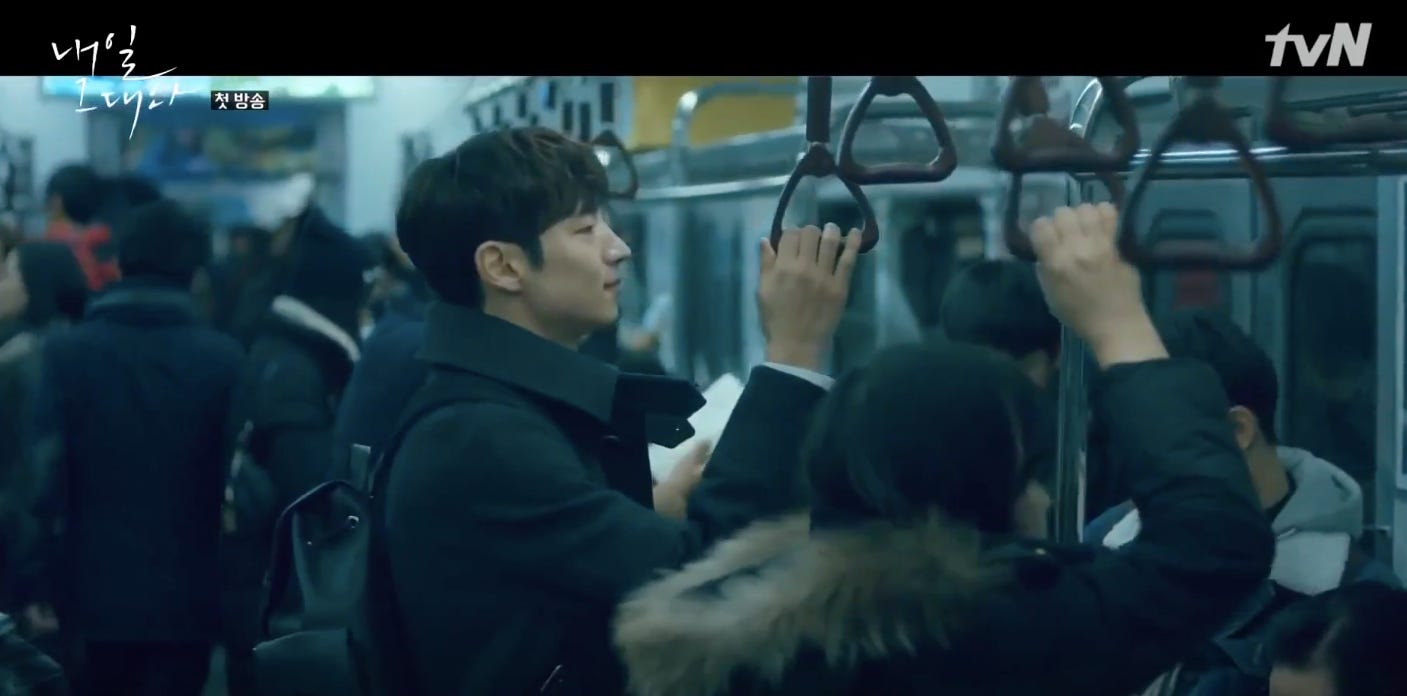
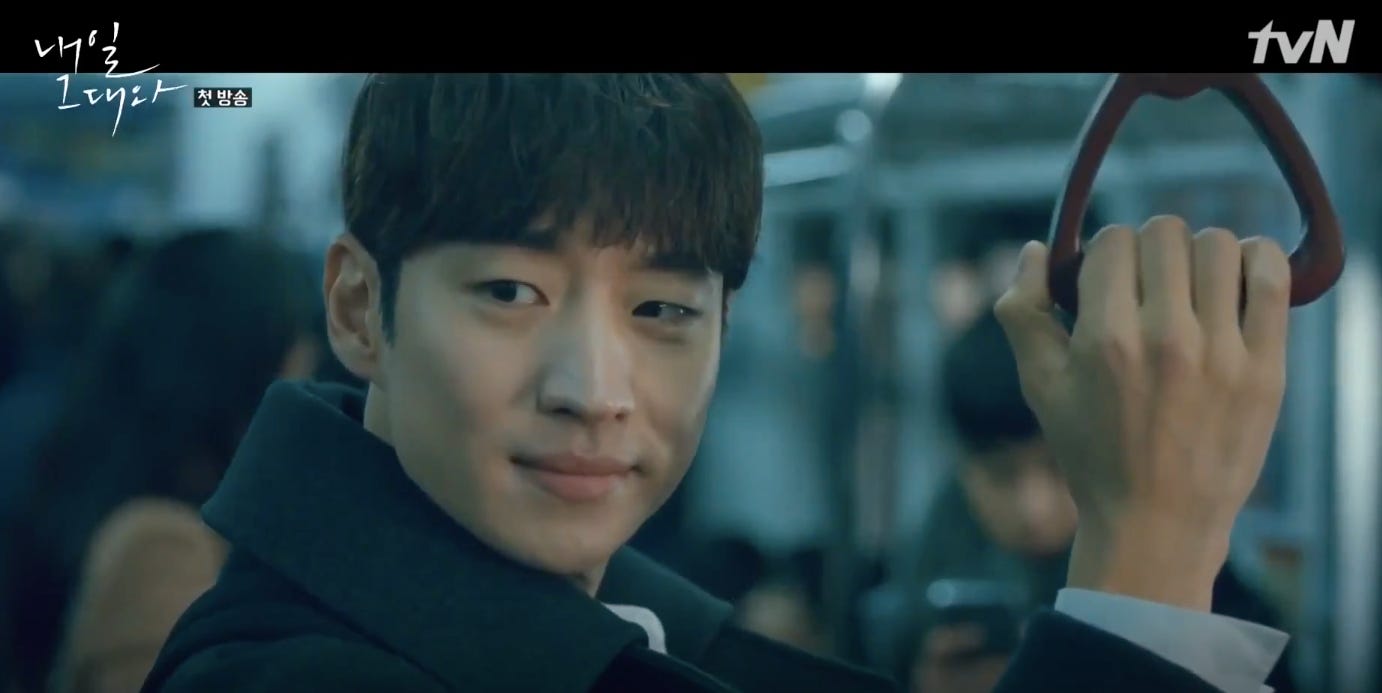


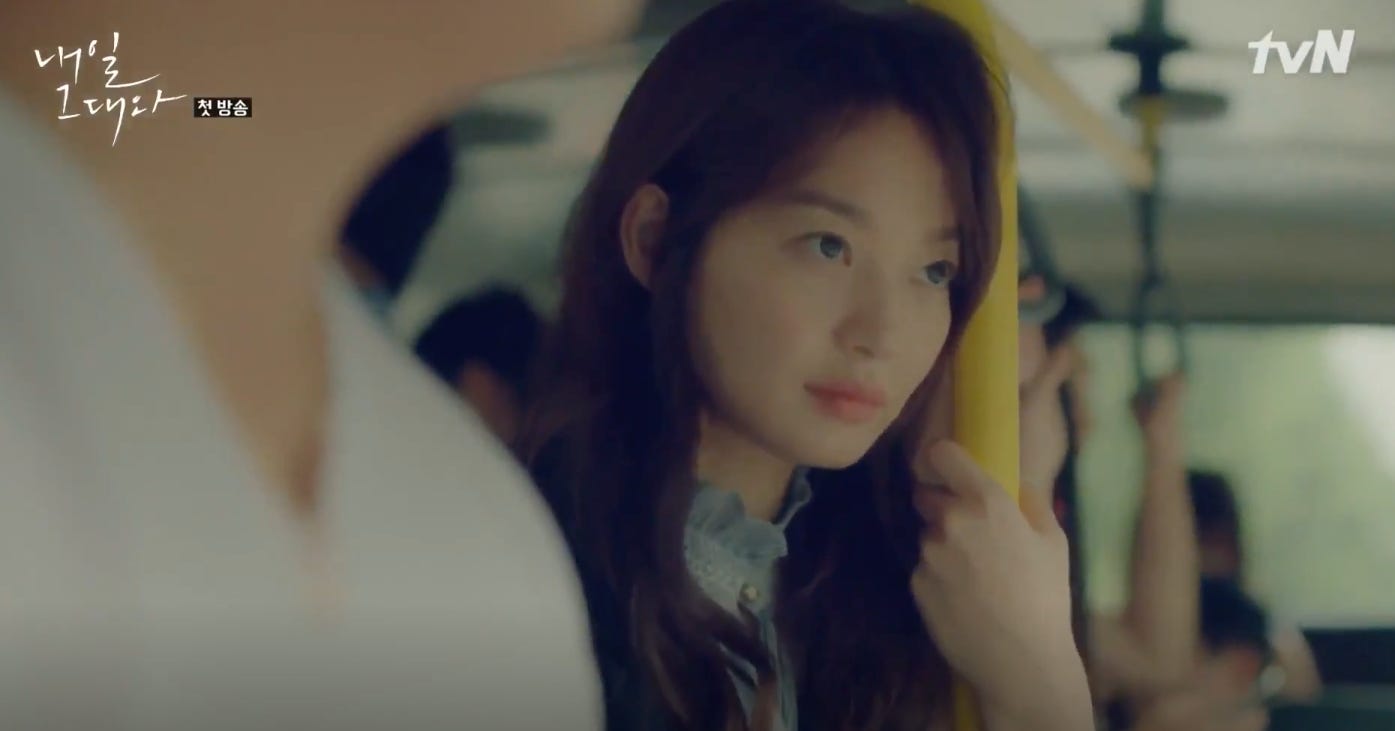
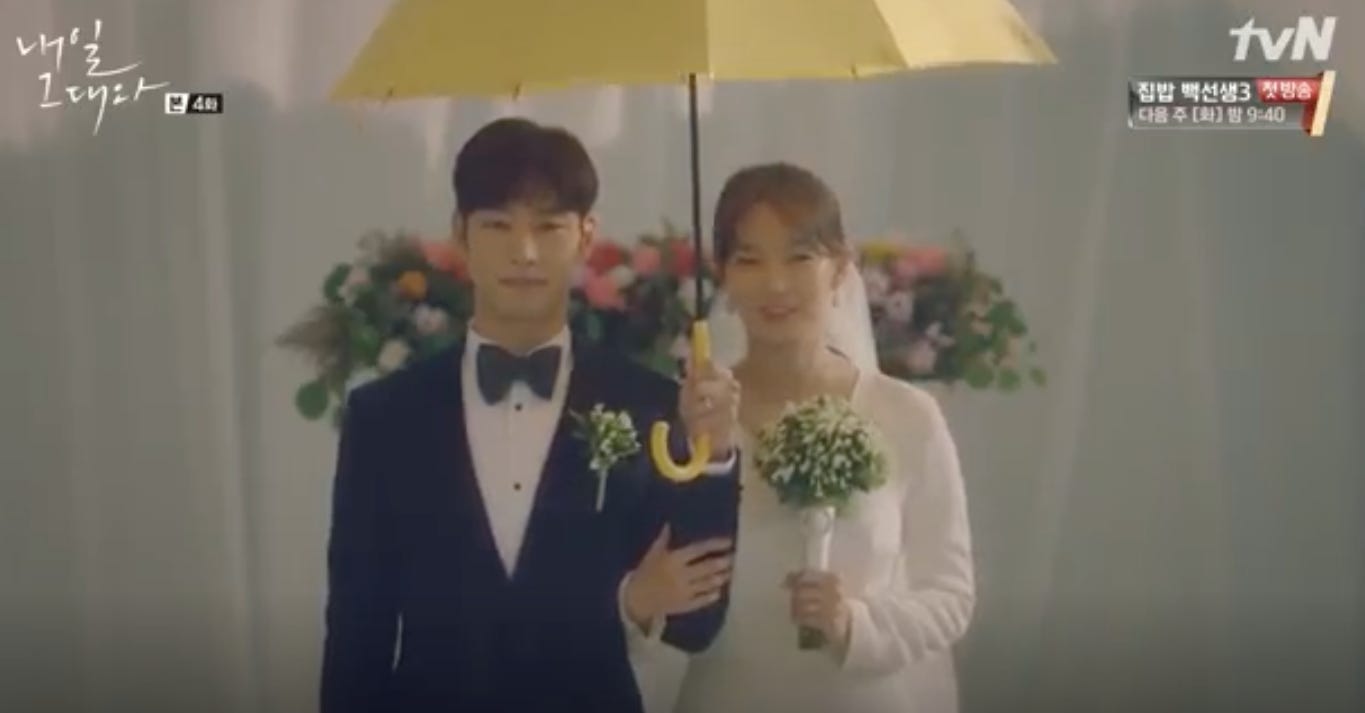


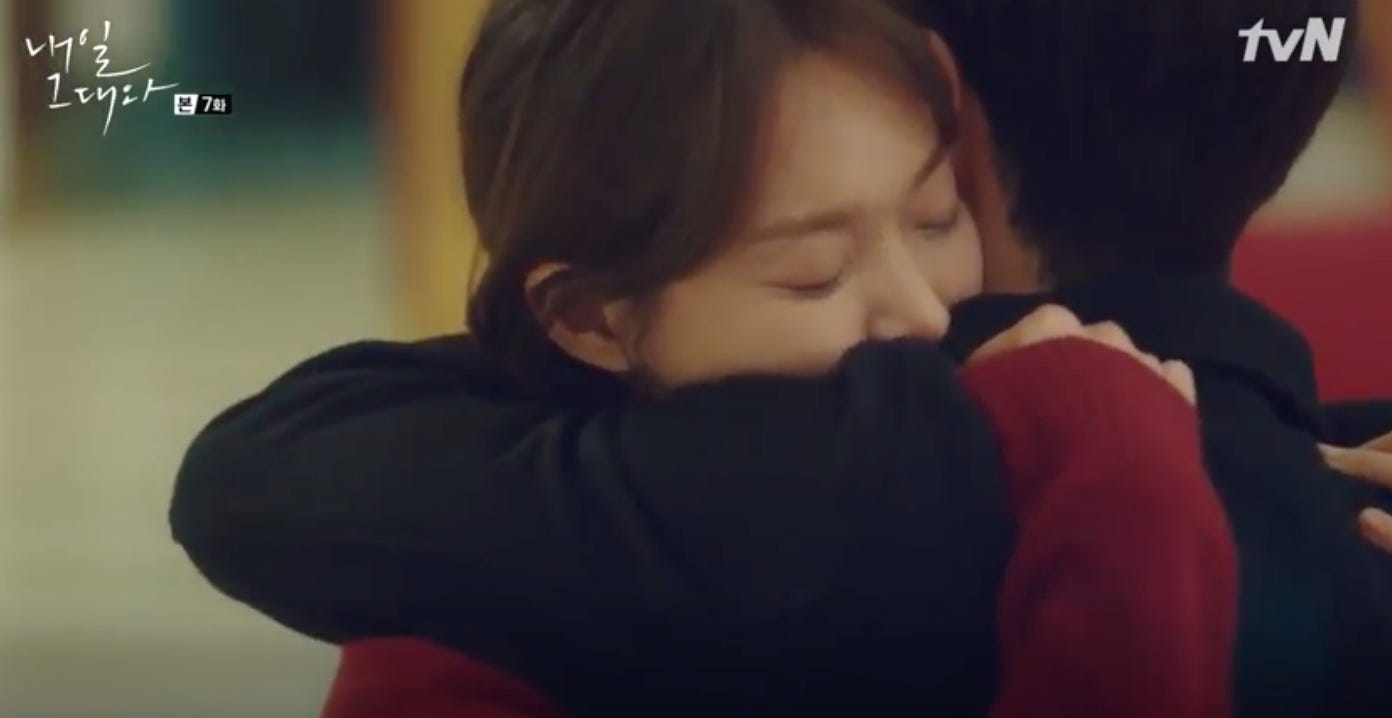
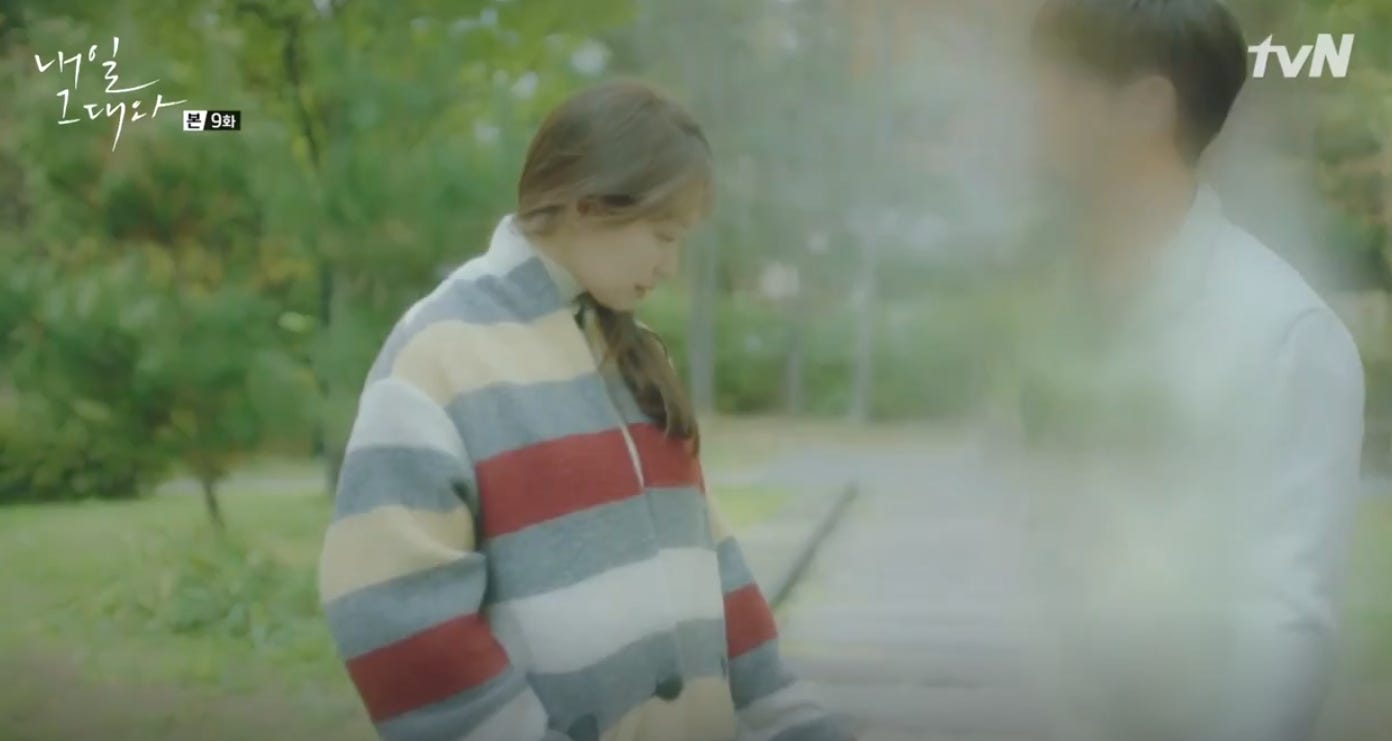

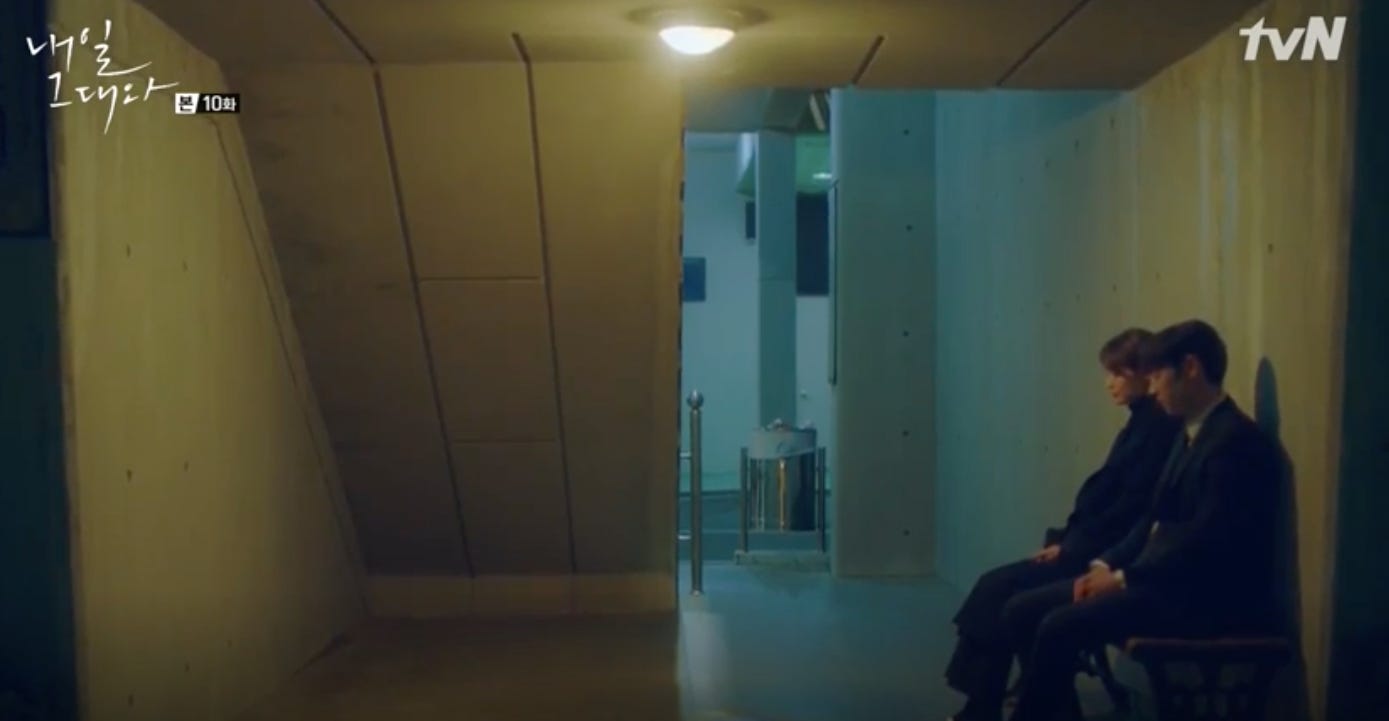

Oooh. This is lovely. This is what this drama is telling us. Not the time travel.